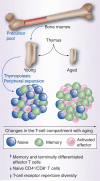The aging immune system and its relationship with cancer
- PMID: 22121388
- PMCID: PMC3222953
- DOI: 10.2217/ahe.11.56
The aging immune system and its relationship with cancer
Abstract
The incidence of most common cancers increases with age. This occurs in association with, and is possibly caused by a decline in immune function, termed immune senescence. Although the size of the T-cell compartment is quantitatively maintained into older age, several deleterious changes (including significant changes to T-cell subsets) occur over time that significantly impair immunity. This article highlights some of the recent findings regarding the aging immune system, with an emphasis on the T-cell compartment and its role in cancer.
Figures

Similar articles
-
Impact of Age and HIV Status on Immune Activation, Senescence and Apoptosis.Front Immunol. 2020 Sep 30;11:583569. doi: 10.3389/fimmu.2020.583569. eCollection 2020. Front Immunol. 2020. PMID: 33117394 Free PMC article.
-
Limited restoration of T cell subset distribution and immune function in older people living with HIV-1 receiving HAART.Immun Ageing. 2025 Jan 8;22(1):3. doi: 10.1186/s12979-024-00497-2. Immun Ageing. 2025. PMID: 39780181 Free PMC article.
-
The immune system in extreme longevity.Exp Gerontol. 2008 Feb;43(2):61-5. doi: 10.1016/j.exger.2007.06.008. Epub 2007 Jul 4. Exp Gerontol. 2008. PMID: 17870272 Review.
-
T cell senescence.Front Biosci. 2001 Feb 1;6:D248-61. doi: 10.2741/linton. Front Biosci. 2001. PMID: 11171551 Review.
-
Can exercise-related improvements in immunity influence cancer prevention and prognosis in the elderly?Maturitas. 2013 Sep;76(1):51-6. doi: 10.1016/j.maturitas.2013.06.010. Epub 2013 Jul 17. Maturitas. 2013. PMID: 23870832 Review.
Cited by
-
Can salivary and skin microbiome become a biodetector for aging-associated diseases? Current insights and future perspectives.Front Aging. 2024 Oct 17;5:1462569. doi: 10.3389/fragi.2024.1462569. eCollection 2024. Front Aging. 2024. PMID: 39484071 Free PMC article. Review.
-
Loss of Sirt2 increases and prolongs a caerulein-induced pancreatitis permissive phenotype and induces spontaneous oncogenic Kras mutations in mice.Sci Rep. 2018 Nov 7;8(1):16501. doi: 10.1038/s41598-018-34792-y. Sci Rep. 2018. PMID: 30405152 Free PMC article.
-
Age-related tumor growth in mice is related to integrin α 4 in CD8+ T cells.JCI Insight. 2018 Nov 2;3(21):e122961. doi: 10.1172/jci.insight.122961. JCI Insight. 2018. PMID: 30385729 Free PMC article.
-
Faster cytotoxicity with age: Increased perforin and granzyme levels in cytotoxic CD8+ T cells boost cancer cell elimination.Aging Cell. 2022 Aug;21(8):e13668. doi: 10.1111/acel.13668. Epub 2022 Jul 11. Aging Cell. 2022. PMID: 35818124 Free PMC article.
-
Recent Advancements in Regenerative Approaches for Thymus Rejuvenation.Adv Sci (Weinh). 2021 May 7;8(14):2100543. doi: 10.1002/advs.202100543. eCollection 2021 Jul. Adv Sci (Weinh). 2021. PMID: 34306981 Free PMC article. Review.
References
-
- Fulop T, Kotb R, Fortin CF, Pawelec G, De Angelis F, Larbi A. Potential role of immunosenescence in cancer development. Ann. NY Acad. Sci. 2010;1197:158–165. - PubMed
-
- Hakim FT, Flomerfelt FA, Boyiadzis M, Gress RE. Aging, immunity and cancer. Curr. Opin. Immunol. 2004;16(2):151–156. - PubMed
-
- Hakim FT, Gress RE. Immunosenescence: deficits in adaptive immunity in the elderly. Tissue Antigens. 2007;70(3):179–189. - PubMed
-
- Sportès C, Hakim FT. Aging, immunity and cancer. In: Fulop T, Franceschi C, Hirokawa K, Pawelec G, editors. Handbook on Immunosenescence: Basic Understanding and Clinical Applications. Springer; Berlin, Germany: 2009.
Grants and funding
LinkOut - more resources
Full Text Sources
